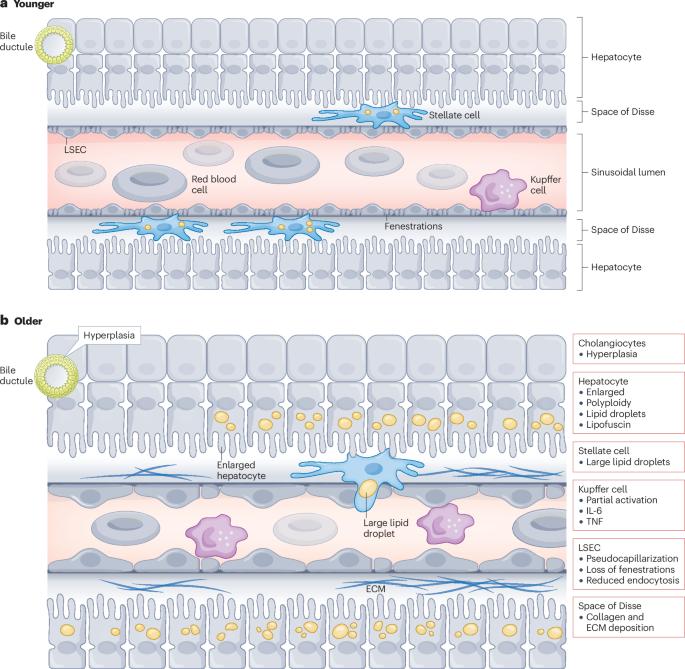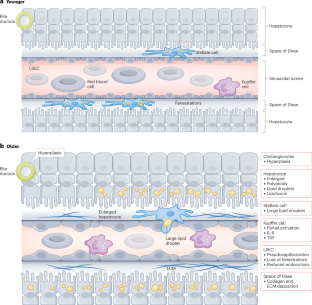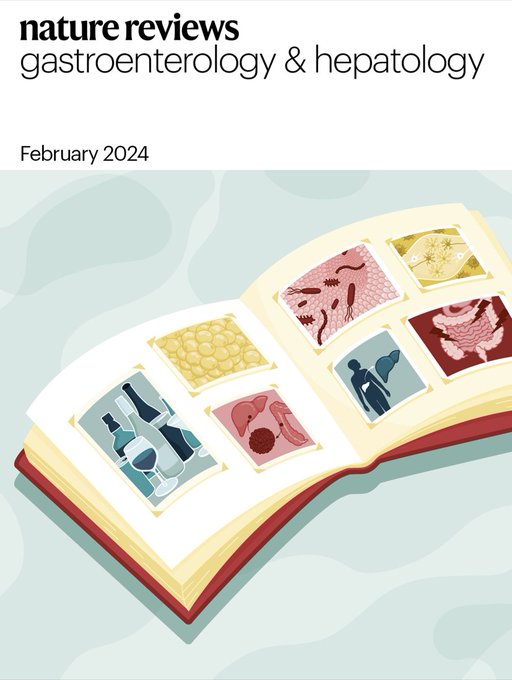Liver, ageing and disease
IF 51
1区 医学
Q1 GASTROENTEROLOGY & HEPATOLOGY
引用次数: 0
Abstract
As the global population ages, research on the biology of ageing and its role in chronic disease is expanding, alongside a growing clinical focus on the unique needs of older adults. In the past, the liver was not thought to undergo substantial age-related changes, nor was there thought to be any liver disease characteristic of older adults. Current studies challenge this perspective, revealing that ageing substantially influences liver pathophysiology at the organ level and within each of the liver cell types. These observations have implications for understanding the pathogenesis of liver diseases common in older adults, including hepatocellular carcinoma, hypoxic hepatitis and metabolic dysfunction-associated steatotic liver disease. Previously, managing older patients with liver disease mostly addressed age-related changes in drug metabolism and liver function tests. However, current clinical practice increasingly emphasizes age-specific issues such as frailty, sarcopenia, multimorbidity and polypharmacy. Given the liver’s pivotal role in systemic metabolism, immunity and detoxification, ageing of the liver can contribute to systemic diseases. In the future, interventions that target ageing biology might offer new treatment options for liver diseases. Here, we review those age-related changes in the liver that have substantial biological and clinical consequences for older adults. Older adults can be affected by multiple chronic medical conditions, including liver disease. This Review provides a comprehensive overview of age-related pathophysiological changes in the liver and discusses interventions and treatment options for older patients.


肝脏,衰老和疾病
随着全球人口老龄化,对衰老生物学及其在慢性疾病中的作用的研究正在扩大,同时越来越多的临床关注老年人的独特需求。在过去,人们认为肝脏不会经历实质性的与年龄相关的变化,也不认为老年人有任何肝脏疾病的特征。当前的研究挑战了这一观点,揭示衰老在器官水平和每种肝细胞类型内显著影响肝脏病理生理。这些观察结果对了解老年人常见肝脏疾病的发病机制具有重要意义,包括肝细胞癌、缺氧性肝炎和代谢功能障碍相关的脂肪变性肝病。以前,管理老年肝病患者主要关注与年龄相关的药物代谢和肝功能检查的变化。然而,目前的临床实践越来越强调年龄特异性问题,如虚弱、肌肉减少、多病和多药。鉴于肝脏在全身代谢、免疫和解毒方面的关键作用,肝脏的衰老可能导致全身疾病。在未来,针对衰老生物学的干预措施可能会为肝脏疾病提供新的治疗选择。在这里,我们回顾了那些与年龄相关的肝脏变化,这些变化对老年人具有实质性的生物学和临床后果。
本文章由计算机程序翻译,如有差异,请以英文原文为准。
求助全文
约1分钟内获得全文
求助全文
来源期刊
CiteScore
52.30
自引率
0.60%
发文量
147
审稿时长
6-12 weeks
期刊介绍:
Nature Reviews Gastroenterology & Hepatology aims to serve as the leading resource for Reviews and commentaries within the scientific and medical communities it caters to. The journal strives to maintain authority, accessibility, and clarity in its published articles, which are complemented by easily understandable figures, tables, and other display items. Dedicated to providing exceptional service to authors, referees, and readers, the editorial team works diligently to maximize the usefulness and impact of each publication.
The journal encompasses a wide range of content types, including Research Highlights, News & Views, Comments, Reviews, Perspectives, and Consensus Statements, all pertinent to gastroenterologists and hepatologists. With its broad scope, Nature Reviews Gastroenterology & Hepatology ensures that its articles reach a diverse audience, aiming for the widest possible dissemination of valuable information.
Nature Reviews Gastroenterology & Hepatology is part of the Nature Reviews portfolio of journals.

 求助内容:
求助内容: 应助结果提醒方式:
应助结果提醒方式:


